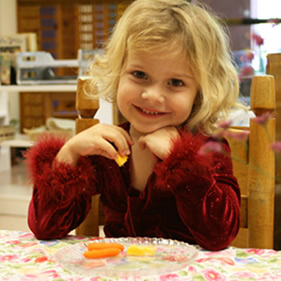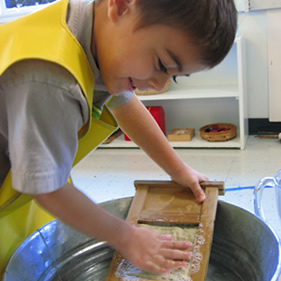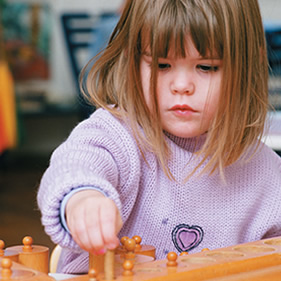


A Love of Learning Starts Here
The Montessori Primary program is an opportunity to nurture your child’s individual development within a group setting. He will emerge with social, emotional, and academic skills while, more importantly, knowing how to function within a group.
Your child has extraordinary powers of mind; she possesses a once-in-a-lifetime ability to simply absorb information and concepts from her surroundings, like a sponge. The Primary classroom, for children between the ages of two and a half to six, is designed to meet the needs of your child in this crucial phase of her life. Her experience in the classroom affects not only the amount of knowledge and skill she will have at her command, but, more importantly, her attitude toward herself, her world, and learning.
Montessori Primary classrooms across the world share the following traits:
Children are engaged peacefully and purposefully in a wide variety of activities.
Many parents are often surprised to see the calm environment of a Primary classroom; in fact, it is designed to help your child become her best self. We support his natural drive for independence by encouraging him to choose activities of interest, without interruption. The resulting feelings of accomplishment and satisfaction engender respect from the children towards others. Through “grace and courtesy” exercises, we teach children how to problem-solve conflicts, how to act politely in various situations, and how to be kind and helpful to their friends. The result is a cohesive community of young children.
It’s a mixed-age class.
Because the learning is individualized, your child can work at her own pace while participating in a mixed-age classroom community. Younger children benefit from examples, and learn from the activities of the older children, while each older child gains the self-confidence that comes with responsibility and leadership.
The children are very independent.
Often, children who don’t do things for themselves simply don’t know how or haven’t been given the chance. Here children have both. We carefully teach your child how to care for her own needs and provide opportunities to practice and improve. When she can successfully care for herself and the environment in which she lives, her demeanor becomes one of self-accomplishment and self-confidence
The learning takes place through the child’s own activity.
An AMI Montessori teacher is trained to introduce your child to many activities and concepts each day, based on her unique development. The learning, however, is not so much taking place in the lesson, as it is through independent activity when she comes back to explore it, repeat it and perfect it.
The classroom is child-centered, not teacher-centered.
Unlike traditional classrooms, where your child is expected to pay rapt attention to the teacher, in the Primary classroom, the teacher is trained to observe each individual child.
You won’t see a Montessori teacher standing in front of the classroom writing on a chalkboard, but rather down at your child’s level, engaged with her or a small group.
The curriculum is highly individualized.
The teacher is trained to recognize and respect the unique potentials operating within your child and strives to connect him to the activity best suited to him at that moment. The art of being a Montessori teacher is in finding the activity that combines both interest and the right level of challenge – not too hard and not too easy. In this classroom, your child will become engaged with an activity, increasing her ability to focus and concentrate.
A wide variety of beautiful, hands-on learning materials helps children learn.
The scientifically designed materials help to develop a new skill or reveal a new concept through your child’s use and exploration. Some provide the opportunity to perfect the practical skills of caring for her own needs or for the classroom environment. Some enrich her vocabulary and open the door to writing, reading, and the parts of speech. Others build on your child’s natural interest in counting and introduce an understanding of the decimal system and the processes of addition, subtraction, multiplication, and division. Some encourage artistic self-expression through the introduction of skills and media. The use of the materials builds a foundation of concrete experiences of abstract concepts, such as mathematics, assisting your child in a deeper level of understanding.
While most of the morning and afternoon are spent in self-directed activity, there are also times in the day for group activities and play.
The teacher may gather a group for songs and stories about social, biological, geographical, and historical themes of interest and your child will have a choice to participate or continue with his activity. Indoor classroom space extends to a safe and contained outdoor environment with gardens and activities, so your child can work outdoors. Most schools also incorporate an outdoor playground for extensive motor activities and play.
There is one trained Montessori teacher and one or two untrained assistants
An AMI-certified Primary teacher has completed a rigorous one-year graduate-level course of study in child development and Montessori philosophy according to standards set forth by Dr. Montessori. He or she is trained to guide a classroom of 28-38 children. The untrained assistants in the classroom are available to help children if needed but are instructed not to interfere with a child’s concentration.
Your child will stay in the Primary classroom for 3 years, including the traditional “kindergarten year”
Montessori is a continuum of education that allows your child to build upon his/her experiences each year. In the first year, the days will be filled with activities centered around “Practical Life”. Here, he learns to sweep the floor, bake bread, polish silver and clean the leaves of plants. He experiments with sensorial materials that educate his visual, auditory, and tactile senses. He plays vocabulary sound games and sings and dances when children gather for group activities.
As the child continues, she is introduced to sounds and symbols which lay the groundwork for reading and writing in the future. She is introduced to numbers and the decimal system – with the most amazing concrete materials to show her the way. She learns about land and water forms, geometric figures, and the political countries of the world; she learns about the parts of plants and animals and about music and art – at her own pace, in her own time.
It is during his third year (the traditional kindergarten year) that everything comes to fruition for your child. Reading, writing, and mathematical understanding blossom from the many seeds that were planted in the previous two years. The child leaves the program with a strong set of academic skills; but, far more importantly, with the attitude that learning is fun, exciting, and boundless.
Your child is now ready to move on to the Montessori Elementary program for children from the ages of 6 to 12 years.